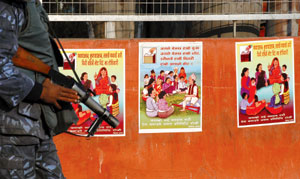 MIN RATNA BAJRACHARYA |
In a nationwide public opinion poll conducted earlier this year by Himalmedia, the publisher of this newspaper, respondents overwhelmingly said they wanted local elections. A recent Carter Center report reaches the same conclusion.
The opening of political space in the last few months has contributed to healing the wounds of conflict and kick-started development work stalled for the last decade, but the report concludes that there are serious challenges to transparency andaccountability.
Local governance these days is carried out by what are euphemistically called all-party mechanisms, and they have grabbed the headlines for all the wrong reasons. From small scuffles over the appointment of user committees to fighting over kickbacks in lucrative road and irrigation projects, the mechanisms have a notorious reputation for corruption.
The same Himalmedia poll showed most people hadn't heard of the mechanisms, and those that had didn't think much of them. It is not hard to imagine why people do not trust them, and prefer to go to council members they elected back in 1999--the last time local elections were held. This is an indication, in spite of being denied the right to elect local leaders for over a decade, the public faith in democracy is still deep rooted. They know that only through accountable local leadership will they get service delivery.
The 'all-party mechanism' was set up earlier this year to fill the vacuum created after local bodies were dissolved 10 years ago. But the body has become a fertile ground for corruption with the appointees from various parties 'cooperating' to divide up allocated budgets.
Politically powerful local members have hijacked influential positions and even supposedly non-partisan bodies like school management committees and user groups overseeing local projects have become grossly politicised. Appointment and dismissal of teachers in school committees and elections to key positions on the committees of the user groups have turned local bodies into battlegrounds.
A journalist in Rukum notes that school management elections frequently lead to turf wars between political parties. Ordinary citizens in the local committees are either excluded or pressured and threatened to fall into line. The report cites examples where positions were even distributed to outsiders under the influence of the political parties.
Road committees were among the most corrupt simply because that is where most money is. In one road committee, the report says, nine of the 15 members were from the village all-party mechanism, with three key position going to NC, UML and the Maoists in clear violation of the government regulations.
In places where the Big Three don't agree on their share of the spoils, projects are indefinitely delayed or even suspended. An irrigation project in Sunsari was suspended because the parties did not agree on positions in the committee and a road project in another VDC is in limbo for years.
At one level, people believe party involvement has helped to overcome bureaucratic hurdles and push through local development. But the lack of elected leaders has made local bodies less transparent.
The Local Development Ministry is making adjustments to policies, and a decision to restrict the tenure of the committee members and make them legally accountable is a welcome one.
The Carter Center's Sarah Levit-Shore says, "Corruption at the local level is linked with larger problem of impunity. For laws and regulations to be effective, they need to be fully enforced. Once it is clear that people will be held accountable for their actions regardless of their political affiliation, the deterrence effect will increase."
The parent parties are silent on the issue, probably because they benefit so much. Senior leaders often use influence at the local level for their own interests, showing that the rot starts right at the top. There is deep disquiet about the conduct of the parties, but most people don't speak for fear of their own safety.
Most people prefer to overlook what goes on in local bodies, and try to get on with their lives the best they can. But it is clear that the democratic deficit at the grassroots is setting back the people's welfare.
See also:
A decade of democratic deficit , ANURAG ACHARYA
Local elections needed to spur local development, most survey respondents say
Read also:
Awesome chance
Unfinished business, RUBEENA MAHATO
The problems of a nation are too complex and entrenched to be corrected by fait accompli decision-making



